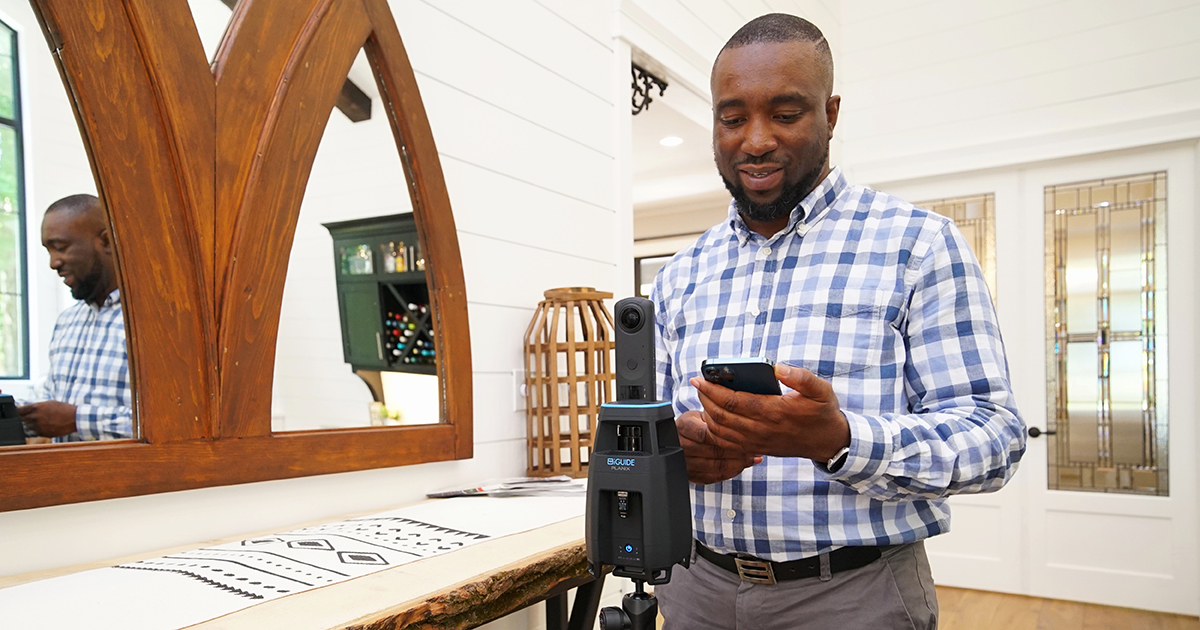Virtual tours or 3D tours, as they are popularly known as, have been gaining some momentum lately. With the new global pandemic, the adoption of this technology became a necessity rather than just a cool add on. The Real estate industry, in particular, is embracing 3D tour technology at an even higher pace than before. Agents and homebuyers in North America are shifting their grounds on what home-sales should look like. Recent studies suggest that with the right content online, over 50% of buyers would buy a sight unseen. Without a doubt, the current scenario presents a great opportunity to enter the 3D tour market or add it as a service to your existing real estate photography business.
Running a business, however, is not a cakewalk and involves a certain degree of risk. Especially, when you are starting from scratch, without any prior industry knowledge or experience. You probably would need to do a considerable amount of planning, to say nothing of a proper market and vendor research. I talk to a lot of real estate photographers and 3D tour providers on a daily basis, and many of them are just making their very first steps into the industry. I often guide them through the key factors to consider when launching a 3D Tour business and would like to share some of them through this blog.
The 3D tour industry is very dynamic. It, thus, becomes vital to stay on top of the latest developments on the market if you want to stay competitive and profitable. Review the information on every single technology company in the 3D tour market, ask for their feedback from existing users, check out pages like the We-Get-Around Forum to see what other people in the space are saying. Also, don’t forget to actually call the company’s sales team. It is unbelievable how you can be privy to so much useful information about their products, services, and even some great promotions that they are offering, by just making that one call.

When you are just starting out, unfamiliar terminology and abundance of all kinds of technologies out there might seem daunting and confuse you to the core. So, it is highly recommended that you evaluate each of these players according to different criteria. Then, based on these yardsticks, you can make a decision about which companies you do want to work with. I will touch upon some of these important criteria here, for you to consider while doing your research:
- Functionality. You need to understand what is included in the services provided. For example, some companies would provide virtual tours only, while others would include still images, floor plans, videos, etc. Additionally, you should also take into account pre- and post-processing that needs to be done at your end, before you send out the pictures to the company; or after you receive the files, to have them ready to be sent over to your clients. Time is money, so the less time you have to spend, the better it is for you.
- Quality of the final product. This includes the quality of the images and the overall quality of the whole tour experience. For instance, how smooth is the navigation between the panoramas and how “clean” the interface is. These are crucial aspects, as your success as a provider would significantly depend on this.
- Camera. You should understand if you can use your own 360 camera or you would need to invest in the proprietary camera. It will make a big difference, not only in terms of the required initial investment but also in the overall quality of the image.
- Capital Expenditure. What is the total cost of the camera and the equipment required to use their services? How much money do you need to pay upfront? Take into account all the other potential expenses which you might incur – shipping, taxes, etc. This number will be vital going forward, in order to calculate your projected return on investment.
- Other equipment. Would you be required to invest in additional equipment to get started? What kind of equipment? What are the costs involved? That’s where the “hidden” fees come into play. We often forget to ask this question and find ourselves unpleasantly surprised when we have to spend some extra few hundred dollars just to use the camera.
- Processing/Subscription Fees. This is an equally important question that you must ask, as every company’s pricing policy and packages are different. While some would charge you a monthly fee regardless of the amount of work you do with their system, others might charge per project and nothing if you don’t use their camera system. Some even have different plans based on your usage. So, do evaluate and factor in this crucial aspect when considering options.
- Speed of capture. How long will it take you to scan a house? The difference in time spent capturing the entire property can be pretty significant. It can vary from 20 minutes to an hour, depending on the technology or tools you are using. Remember, the less time you have to spend on one property, the more properties you can photograph in one day.

- Turnaround time. How long will it take to get your 3D tour up and running from the moment you’ve sent it to your technology partner? The time might vary from a few hours to a couple of days, again, depending on the solution and the property you are scanning. More complex and bigger-size buildings will take longer to get processed but make it a point to ask the solution provider you are considering, about their standard turnaround time.
- Customer service. The importance of good customer service is hard to overestimate because, ideally, you are looking for a long-term partner who will be responsive at all times (especially when you need them urgently). Good customer service includes everything from getting back to you in a timely manner when you are just thinking about buying the camera to prompt technical and marketing support all through.
- Training and tech support. What kind of training is provided and how long will it take you to learn how to use the system? Is it user-friendly? What kind of tech support are they providing? The easier the system is, the faster you will learn how to use it and start making money with it. Make sure that the company of your choice provides enough information on how to use the camera and is there for you when you have questions.
- Marketing assistance. Are they providing any type of marketing support? Will they help you generate leads? This is especially important if you are just starting your own business and seeking your first set of clients. There are various ways in which your technology provider can support your marketing efforts, ranging from promotional materials to website development to lead generation events, and so on.
- Promotions and discounts. Are there any discounts or promotions that you need to be aware of? Always check, it will save you a buck. Don’t forget to ask the salesperson you are dealing with, about any discounts they may be offering or any ongoing promotions that you should know of. A penny saved is a penny earned!
- Data ownership. Who owns the data once it’s processed? Can you download it or will you have to keep it on their servers? It might be quite relevant for many of your clients, especially if you are dealing with commercial ones. Clarity around this crucial aspect could help you avoid getting into potential legal issues in the future.
These are some of the most important questions you must ask and factors that should be considered when researching and comparing different solutions. So, next time you are browsing the websites, reading reviews or talking to a sales representative from a 3D tour technology company, pay close attention to these criteria and try to find answers to all these queries in order to evaluate and make an informed decision based on what best suits your needs.
I will also be touching upon how to properly calculate your expenses and revenue, to determine whether it makes financial sense to invest in the equipment of your choice, in my upcoming blogs. So stay tuned and watch out this space for more information around starting your own 3D tour business.






